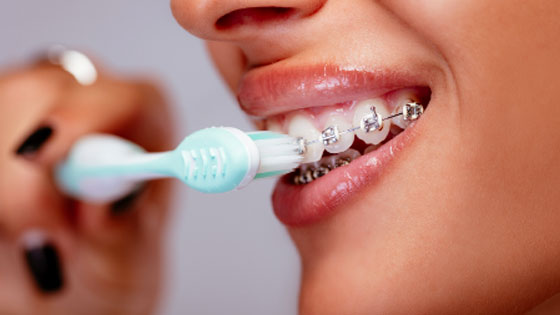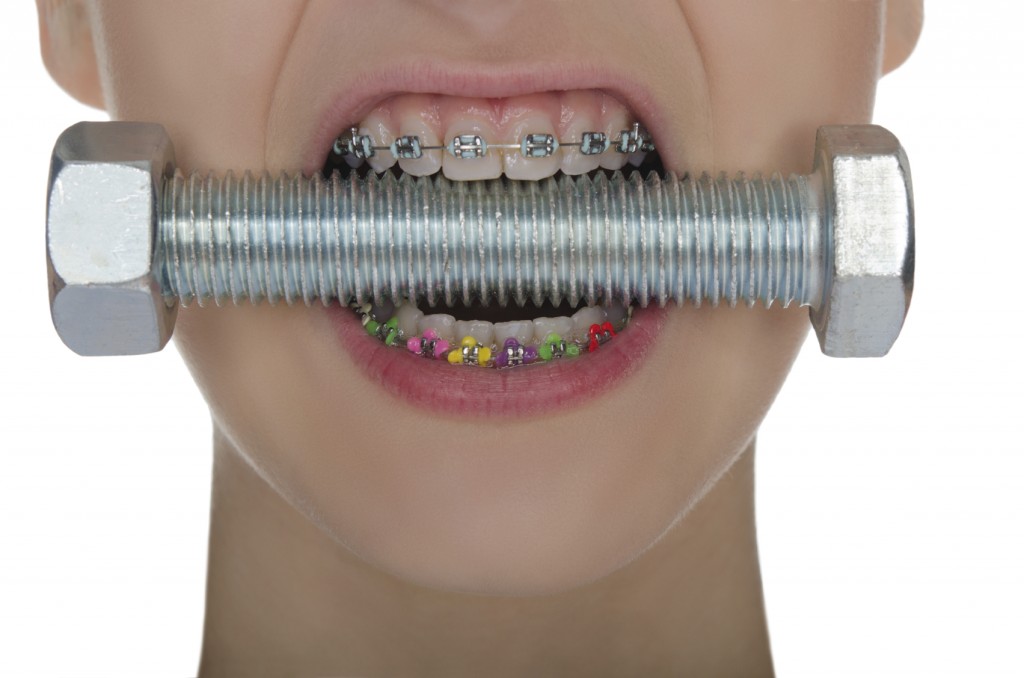Now that you have your braces, what can you expect and how do you take care of them?
Brushing and Flossing

It is very important to brush and floss regularly when you have braces so that the teeth and gums remain healthy during orthodontic treatment. Patients should continue to see their general dentist every six months for cleanings and dental check-ups. Adults who have a history of gum disease should also see a periodontist during orthodontic treatment.
Eating with Braces
What can you eat? Initially, for the first day or so after the appliances are placed, stick to soft foods; avoid tough meats, hard breads, and raw vegetables. You will need to make an effort to protect your orthodontic appliances by avoiding certain foods that have a tendency to break them.
Foods to Avoid

- Chewy foods: bagels, hard rolls, licorice, granola bars
- Crunchy foods: popcorn, ice, chips
- Sticky foods: caramels, gum
- Hard foods: nuts, candy
- Foods you have to bite into: corn on the cob, apples, carrots, meat on a bone (ribs)
There are a few tricks to get around some problem foods. For example, you can cook your vegetables to make them softer, cut your corn off the cob, and slice apples and sandwiches into small, bite sized pieces.
Chewing on hard things (for example, pens, pencils or fingernails) can also damage the braces. Damaged braces will cause treatment to take longer.
General Soreness
At the start of orthodontic treatment, you may initially feel slight soreness in your mouth and your teeth may be tender to biting pressures for a few days. Over the counter pain relievers, such as Tylenol or Advil, may be taken as needed to address this mild discomfort. The lips, cheeks and tongue may also become a bit irritated for one to two weeks as they toughen and become accustomed to the braces. We will supply wax to put on the braces in irritated areas to lessen the discomfort.
Loosening of Teeth
This is to be expected throughout treatment. Don’t worry! It’s normal. Teeth must loosen first so that they can move. The teeth will firm up in their new corrected positions after treatment is completed.
Separators/Spacers
Separators, or spacers, are small donut shaped rubber rings or wire springs that fit between your teeth. They are used to create small spaces between your teeth that allow for the fitting of orthodontic appliances or bands at the following appointment. Separators typically remain between the teeth until your next appointment (usually 1-2 weeks).
Separators may:
- Make you feel like you have food stuck between your teeth that you can’t get out. This is annoying, but please do not play with them or they may fall out.
- Make your teeth feel sore. Usually, this discomfort is mild but may last for several days. If you are uncomfortable, consider taking an over the counter pain reliever (such as Tylenol or Advil) and rinsing your mouth with warm salt water.
- Feel like you’re biting on them. This is normal, as the spacers may interfere when you bite down.
- Get pulled out or fall out. Remember to check your spacers every night and count them to be sure they are all still there! If not, please give us a call so that we can determine if they need to be replaced. Generally, if the spacers fall out the day of or the day before your next appointment, we will not need to replace them. However, a lost spacer may make it difficult to fit a band or appliance around your tooth, so please call us to ask.
Loose Wire or Band
Don’t be alarmed if a wire or band comes loose. This happens occasionally. If a wire sticks out and is irritating, use a blunt instrument (eraser end of a pencil) and carefully, gently push the irritating wire back under the arch wire. Simply get it out of the way. If irritation to the lips or mouth continues, place wax on the wire to reduce the annoyance. Please call our office as soon as possible for an appointment to check and repair the problem.
Rubber Band Wear
To successfully complete orthodontic treatment, the patient must work together with the orthodontist. Certain orthodontic problems require patient cooperation with wearing different kinds of rubber bands at home. In these cases, in order to achieve the desired orthodontic outcome, it is necessary that the patient consistently wears the rubber bands or other auxiliaries exactly as prescribed. Lack of cooperation, failure to follow instructions and damaged appliances are all factors that can lengthen the total treatment time.
Athletics

If you play sports it is important to wear a protective mouthguard. We recommend purchasing one from Shock Doctor made specifically for patients with braces. We do not recommend using the boil and bite mouthguards as they will prevent your teeth from moving, break your brackets off, and will negate the positive effects of your orthodontic treatment.
